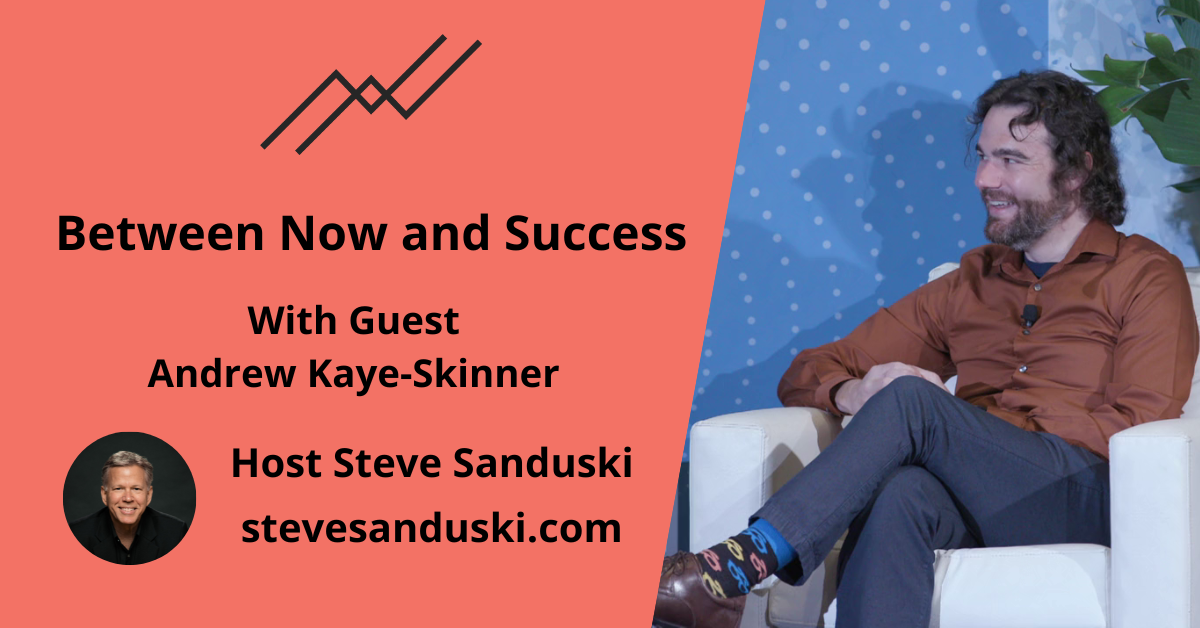Andrew Kaye-Skinner is a Senior Product Trainer for Advisor Group, which is one of the country’s largest independent broker dealers.
Andrew and I discussed how he taps into his theater and linguistics background to deliver effective training to financial advisors. We also touch on some adult learning theory topics that will help you get your message across whether you’re training your team of advisors or preparing to speak at an event.
“The ROI on education.”
“The trick of training financial advisors is getting them to understand the ROI on that education,” Andrew says. “So often, they’ll say, ‘Well, I don’t need training on this. I know these products.’ And yes you do, that is your bread and butter. That’s how you’ve made it so far in the industry. But there have been so many changes, even in familiar products, that just little touches and retraining can be necessary, without making it feel like a chore.”

Steve Sanduski, CFP® and Andrew Kaye-Skinner
Rule #1 for Andrew is that his training sessions run 20 minutes max — go longer, and you risk losing an audience’s attention. Andrew is also very mindful of the different ways that people learn. As much as possible, he presents information via audio, visuals, and text simultaneously. That way, his audience will self-select their preferred intake method and he can effectively communicate to a wider audience.
Large public presentations have a different set of built-in challenges. “You have to maintain a distractible audience,” Andrew says, “and we’re all distractible no matter how much we think we can focus. So, with a public presentation, it can be very helpful to have large-format visual aids. You may put a couple sentences on a PowerPoint slide, but then speak for several paragraphs around those two sentences. And that’s a good way to get people to visually key in on an idea that you want them to remember, but then talk more about the depth of that idea.”
“’Action’ is the root of ‘acting’.”
One of the easiest ways to lose an audience is to show up unprepared. When I’m prepping for a big speaking engagement, I live by the Navy SEAL rule “Two is one, one is none.” Meaning, I always have a digital and a hardcopy backup of what I’m going to say so that if a computer crashes or a projector burns out, I’m still ready to go.
But I also put in the prework to know that presentation forwards and backwards so I’m not reading straight off a computer screen or a stack of notecards. One new tip I picked up from Andrew is that many actors memorize their lines while moving around, rather than sitting down in front of a script. “‘Action’ is the root of the word ‘acting,’” he says. “What actors have learned is if you tie a physical action to something you are trying to learn, then it gets imprinted in multiple parts of your brain and it’s much more likely to stick with you. And it will be easier for you to recall because it not only tied to your visual memory, but it’s also going to have a muscle memory aspect tied to it.”
Once you have your material down and you’ve created some of those muscle memories, you’ll be in a better position to engage your audience, rather than read to them. If you lean too heavily on a script, you’re going to sound robotic, and folks will check out.
“Just write down your key points,” advises Andrew. “You don’t need to write out your entire PowerPoint script, but just key points that will trigger a memory for the next thing that you want to talk about. That’s huge, because it allows you to have a small visual aid that you can refer to. ‘I want to talk about long-term investments …’ and that’ll trigger your mind to, ‘Oh yeah, I want to say X, Y, and Z about that.’”
“Training becomes exceptionally important.”
Andrew uses the annual priority lists from FINRA and the SEC to decide what topics he needs to present to Advisor Group clients in the year ahead. On the alternative side, he’s paying close attention to anything that’s on Advisor Group’s approved product list, which continues expand as the space innovates and client demand grows. Not every product on Andrew’s list is super complicated, but he recognizes that whatever regulators are looking at, Advisor Group needs to be looking at as well.
“Don’t overlook the necessity of taking an extra small training course,” Andrew says. “It’s not just alternative investments, it’s equities and mutual funds, even bonds. The more complex they get, the more questions that are going to be asked of all of us. And training becomes exceptionally important. If you can document that you’ve had training and speak to the complex topics within that training that can only serve you.”
And, just as importantly, your clients.
Want to view more content from CAIS’ Alternatives Investment Summit? Sign up for their learning platform, CAIS IQ.





